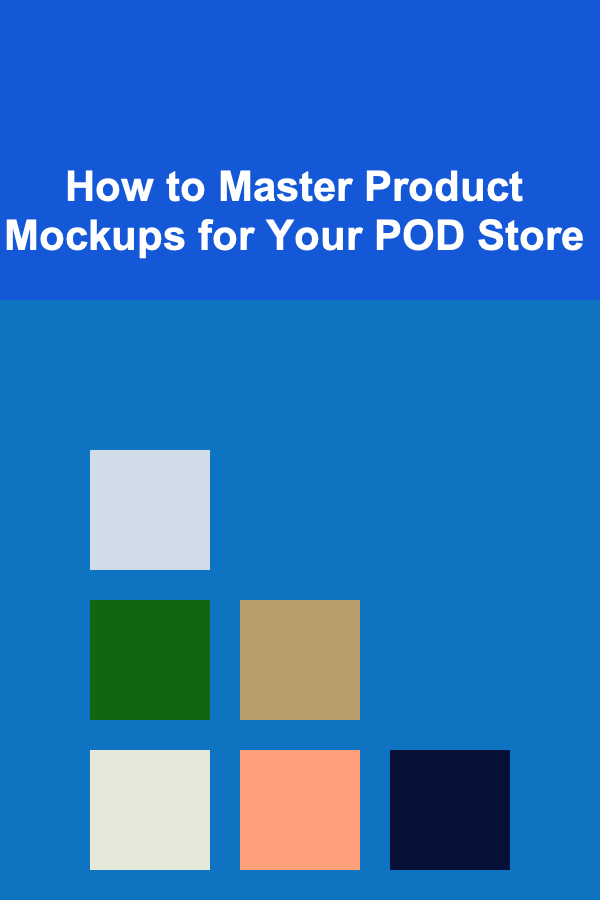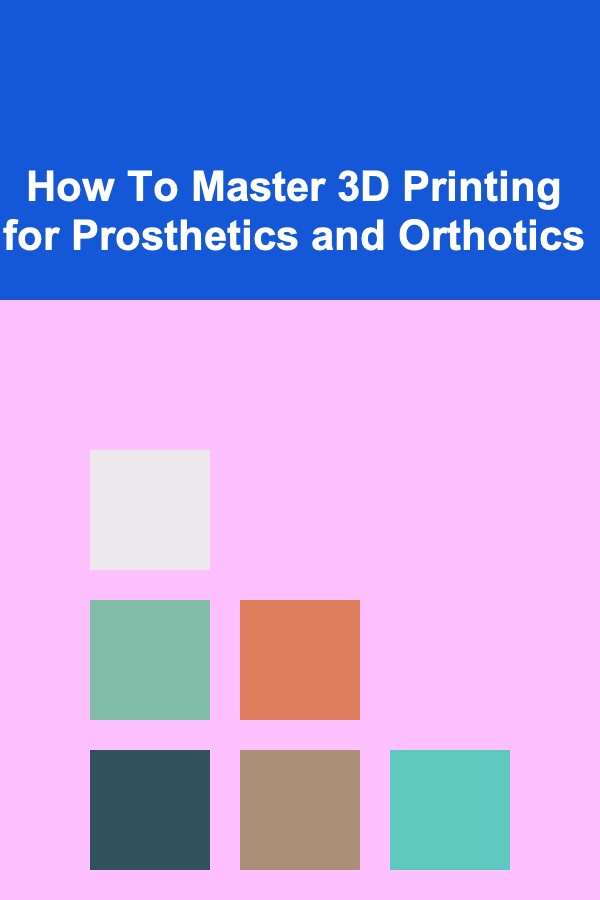
How to Master Product Mockups for Your POD Store
ebook include PDF & Audio bundle (Micro Guide)
$12.99$9.99
Limited Time Offer! Order within the next:

Creating high-quality product mockups is one of the most essential skills for any Print-on-Demand (POD) store owner. Whether you are selling apparel, accessories, home decor, or any other custom products, mockups serve as the first impression of your brand for potential customers. A well-designed mockup can significantly influence purchasing decisions, so understanding how to master this art is crucial for your store's success.
In this article, we will dive deep into how to create, enhance, and utilize product mockups effectively. We will cover everything from choosing the right tools and platforms to advanced techniques that will make your POD store's mockups stand out.
What are Product Mockups?
Before we dive into how to master mockups, it's essential to understand exactly what they are. In simple terms, a product mockup is a digital rendering or photograph of your design applied to a real-world product. It showcases how your design would look on a physical item, such as a T-shirt, mug, phone case, or tote bag.
Product mockups allow customers to visualize the final product without needing to hold it physically, which is particularly important for online stores. For POD sellers, these mockups are key to showing your designs in a professional, high-quality manner that persuades customers to make a purchase.
Why are Product Mockups Important?
Product mockups are not just visually appealing---they serve a number of important purposes in the online sales process:
- Professionalism: High-quality mockups elevate the appearance of your store and brand. They help establish trust with your customers.
- Conversion Optimization: A well-designed mockup can increase your store's conversion rate by giving customers a clear idea of what they are purchasing.
- Marketing: Mockups are essential for marketing, whether it's on social media, ads, or email campaigns. High-quality images make your marketing materials more attractive and professional.
- Previewing Design Impact: They allow you to visualize how your designs will look on different products, making it easier to fine-tune and perfect your concepts.
- Social Proof: Displaying mockups on platforms like Instagram or Facebook can help build social proof. If people see your products in action, they're more likely to trust your brand.
Given their importance, mastering the art of creating product mockups is critical for any serious POD store owner.
Choosing the Right Tools for Mockups
To master product mockups, you need the right tools to bring your designs to life. Below are some of the most popular tools for creating professional mockups:
1. Photoshop
Photoshop is the industry standard for graphic design and photo editing, making it one of the best tools for creating detailed and high-quality mockups. You can either create mockups from scratch or use pre-made templates. Photoshop allows you to work with layers, apply different textures, and refine your designs to achieve perfection.
2. Canva
Canva is a more user-friendly, web-based tool that allows you to create mockups quickly. While it may not offer the same level of detail as Photoshop, Canva is perfect for beginners or those with limited graphic design skills. It comes with an array of mockup templates, and you can easily drag and drop your designs onto various products.
3. Placeit
Placeit is an online platform that specializes in creating high-quality mockups for POD stores. You can choose from thousands of templates for different products like T-shirts, hoodies, mugs, and more. With Placeit, you don't need advanced graphic design skills. You simply upload your design, and Placeit will automatically generate a realistic mockup.
4. Smartmockups
Smartmockups is another online tool that provides a simple way to generate realistic product mockups. It offers a wide selection of product categories and mockup styles, allowing you to create mockups in a few clicks. It also integrates with platforms like Shopify and Etsy, making it convenient for POD store owners.
5. Mockup Generator by Printful or Printify
If you are using a POD service like Printful or Printify, they often offer built-in mockup generators. These tools allow you to upload your design and instantly create mockups that are ready to be displayed on your store. These generators typically offer a wide range of product options and styles.
Tips for Creating High-Quality Mockups
While the tools you use to create mockups are important, the quality of your mockups also depends on the techniques and attention to detail that you apply. Here are some essential tips to ensure your mockups stand out:
1. Use High-Resolution Images
When creating product mockups, it's crucial to use high-resolution images for both the design and the mockup itself. Low-resolution images can look pixelated or blurry, which detracts from the professionalism of your store. Ideally, you should use images that are at least 300 DPI (dots per inch) for optimal print quality.
2. Choose Realistic Mockup Templates
Using realistic mockup templates is key to making your designs appear lifelike. Select mockups that fit the style of your products and the aesthetic of your brand. For example, if you're selling luxury items, choose mockups with clean, minimalist backgrounds. If your products are playful or trendy, opt for mockups that feature a more casual or colorful setting.
3. Pay Attention to Lighting and Shadows
Lighting and shadows are crucial for creating mockups that look realistic. Ensure that the lighting in your mockup matches the light source in your design. If your design has shadows, make sure they align with the mockup's natural lighting. Consistency in lighting helps make the final product appear more authentic and visually appealing.
4. Show Multiple Angles
If possible, showcase your designs from different angles. Customers want to get a comprehensive view of what they're buying. By displaying mockups from multiple perspectives (front, side, close-up), you give your customers a better understanding of the product, which increases their confidence in making a purchase.
5. Avoid Overcrowding the Image
While it may be tempting to add a lot of elements to your mockup images, simplicity is often better. Avoid overcrowding the mockup with too many details, as this can detract from the design itself. Keep the focus on your product and design, allowing them to take center stage.
6. Customize the Backgrounds
Customizing the background of your mockups can help your products stand out. While plain white backgrounds are common, sometimes adding a little texture or color can make your mockups more engaging. Choose backgrounds that complement your design and reflect the overall theme of your store.
7. Ensure Proper Scaling
It's important to make sure your designs are properly scaled when placed on the product in the mockup. Avoid stretching your design, as this can lead to distortion. Instead, resize the design to fit the product's dimensions appropriately. Some mockup platforms offer auto-scaling features, but always double-check the proportions for the best results.
8. Incorporate Lifestyle Shots
Lifestyle shots add a personal touch to your mockups. Instead of just showing a static product image, consider using mockups where the product is shown in use. For example, a T-shirt mockup can feature a person wearing the shirt in a real-world setting. This helps customers imagine themselves using your product and can increase conversions.
Advanced Techniques for POD Mockups
Once you're comfortable with the basics, you can implement some advanced techniques to take your mockups to the next level:
1. Create Custom Mockups
If you have the skills and time, creating custom mockups can set you apart from competitors. You can take professional photographs of products and edit them in Photoshop, ensuring they align with your brand's identity. Custom mockups give you more control over the final look and allow for more creative freedom.
2. Use 3D Mockups
3D mockups can make your products appear even more realistic. While they require more advanced software like Blender or Cinema 4D, 3D mockups allow customers to rotate and view your product from all angles. This technology can give your POD store a futuristic and cutting-edge feel.
3. Incorporate Animated Mockups
Animated mockups are a fantastic way to add dynamism to your store. You can create subtle animations of your products, such as rotating views or interactive previews. These can be especially effective for showcasing phone cases or apparel where customers can see the design in motion.
4. Brand Your Mockups
Branding is a key element of establishing your POD store's identity. By adding your logo or watermark to the mockups, you create a sense of consistency across all your visuals. It also helps prevent others from using your images without permission.
How to Use Mockups to Increase Sales
Now that you know how to create and refine your mockups, the next step is learning how to use them effectively to increase sales:
1. Create Compelling Product Pages
Your product pages should showcase your mockups in the best light. Make sure to provide clear, high-quality images with detailed product descriptions. Include multiple mockups to give customers different perspectives of the product. Adding mockups that reflect various sizes or colors can also help potential buyers make decisions faster.
2. Leverage Social Media
Social media is a powerful tool for promoting your POD store. Use your mockups to create engaging posts, ads, and stories on platforms like Instagram, Facebook, Pinterest, and TikTok. High-quality visuals will draw attention and encourage users to check out your store.
3. Test and Optimize
A/B testing your mockups can help you identify which styles or images resonate best with your audience. Try different mockup designs, angles, and background styles to see which ones generate more clicks or conversions. Use this data to optimize your store and marketing materials.
Conclusion
Mastering product mockups is an essential skill for any POD store owner looking to stand out in the competitive online marketplace. By using the right tools, techniques, and strategies, you can create professional and high-converting mockups that showcase your designs in the best possible way.
From choosing the right platform to paying attention to detail in your images, the key to success lies in creating mockups that are visually appealing, realistic, and aligned with your brand. With these skills in hand, you'll be well on your way to increasing sales and establishing a strong online presence for your POD business.

How to Create a Family Recipe Book Together
Read More
How to Develop a Sales Territory Strategy for Effective Coverage
Read More
How to Incorporate Vintage Decor into Your Home for Less
Read More
How To Master 3D Printing for Prosthetics and Orthotics
Read More
Understanding Quantum Cloud Services
Read More
How To Find Your Personal Truth
Read MoreOther Products

How to Create a Family Recipe Book Together
Read More
How to Develop a Sales Territory Strategy for Effective Coverage
Read More
How to Incorporate Vintage Decor into Your Home for Less
Read More
How To Master 3D Printing for Prosthetics and Orthotics
Read More
Understanding Quantum Cloud Services
Read More